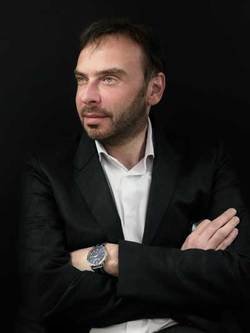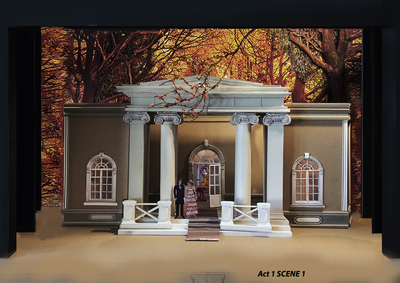Interview:Dmitry Bertman on Eugene Onegin
 -At the New National Theatre, Tokyo, we haven't staged the opera Eugene Onegin for nineteen years, so we are very excited about the new production.
-At the New National Theatre, Tokyo, we haven't staged the opera Eugene Onegin for nineteen years, so we are very excited about the new production.
Bertman: I've been told that Tchaikovsky's music is very popular in Japan so I'm very happy about that. Eugene Onegin is a masterpiece of Russian opera and it was created by two great Russian artists, namely the poet Pushkin who wrote the original story and the musical genius Tchaikovsky.
Pushkin's poetry is written in a beautiful style, but his characters are always in conflict with each other and Eugene Onegin is no exception. Onegin and Tatyana want to love each other but they don't see eye to eye and tragedy happens. Still, Pushkin writes this with some humour, but Tchaikovsky composes it more as an opera of penitence. He wasn't particularly interested in Pushkin but he found that he could connect emotionally to some parts of Eugene Onegin and he created his opera by putting these parts together.
-Tchaikovsky had a patron when he was writing this piece?
B: Vladimir Shilovsky was Tchaikovsky's patron before he got to know Nadezhda von Meck, who is better known as his benefactor. Young and wealthy, Shilovsky lavished money on Tchaikovsky, including paying for foreign trips. But because he had a reputation for being flamboyant in both fashion and lifestyle, their relationship became the talk of town and Tchaikovsky's reputation and image was put at risk. It was at such a time that he was approached by his student Antonina Miliukova with passionate love letters, and he eventually agreed to marry her in order to end his relationship with Shilovsky. They fell out badly and in revenge, Shilovsky married before Tchaikovsky.
Tchaikovsky threw away all his memorabilia with Shilovsky, but in the latter's huge mansion, an enlarged photograph of Tchaikovsky - almost life size - hung on the wall even after his death. In those days it was very difficult to print a photograph of that size, but he had it done.
-I wasn't aware there was such a story between them.
B: It's not widely known actually. Anyway, Eugene Onegin as an opera became Tchaikovsky's creation with only a small element of Pushkin. His model for Tatyana was Miliukova. Therefore he started composing from the Letter Scene.
A feature of Tchaikovsky's music is that often the text of the aria and the actions of the characters are contradictory. The music is expressing the character's psychological state, which means that the text and the content of the music don't match. There is a saying 'one great use of words is to hide our thoughts' and Tchaikovsky was a master of this. In his music, the text always has an underlying meaning - this is what sets Tchaikovsky apart from other composers and is the most significant feature of his music.
-Could you give us an idea about your staging in October?
B: In Russia, opera directing is said to have begun in 1922, with a staging by Konstantin Stanislavsky. So I will take his staging as a motif and create a new work that is both contemporary and emotional.
-You mean Stanislavsky, the founder of Moscow Art Theatre, known for the Stanislavsky method of acting?
B: Yes, that's right. The hall he directed in 1922 is preserved as the Onegin Hall in the Stanislavsky House Museum. It's a hall with four columns, and when he first visited the place he felt a strong desire to produce Eugene Onegin there and he realized it.
Set Plan for Eugene Onegin
-At the Helicon Opera in Moscow, where you are the Artistic Director, you reproduced Stanislavsky's staging in 2015.
B: Yes, this production is still in repertory but the staging at the New National Theatre, Tokyo will of course be different. In fact, only a few photos survive from the original Stanislavsky production so we don't know much about how it was actually performed. Therefore Stanislavsky is only a motif. The staging will be more about what he might have done if he were alive now and working with the people of today.
I've directed seven different productions of Eugene Onegin. When I directed it in Austria, I set it in a civilization that had stopped in time, and when I did it in Stockholm I set it in an IKEA store! In the production in St. Petersburg, all the characters were travelers who had just met at the train station. Every time I've sought for an original approach and I staged it in all sorts of settings. However I realized that I should go back to the roots of the work, so in 2015, I reconstructed Stanislavsky's production, basing it largely on the philosophy of the work and the psychology of the singers' acting. Before the production, many people said to me "why are you reviving an old production?" but it was a huge success and nowadays it's one of the most popular operas in Moscow and difficult to get tickets. Modern audiences, who have seen a variety of productions, are seeking for a beautiful staging. In that sense, this production is fitting for our age. In the Tokyo production, however, I want the costumes to be slightly quirky and distorted.
-Helicon Opera is not yet widely known in Japan. Could you introduce the company?
B: Without bias, I think this is the best theatre in the world. It was founded in 1990, just before the fall of the Soviet Union and at a difficult time, so we didn't get any state support but fortunately they didn't interfere either. For the first three years we had no money but we were like a family and we spent all our time together both at work and on holiday. Now we have 500 people working including artists and staff, but we still maintain a family atmosphere. Our artists are very talented and our chorus is the best in the world, both in singing and acting. Sometimes our soloists are invited to make guest appearances with the Bolshoi Opera. Many of our artists have become international stars, but they still sing at Helicon Opera as their home. We have a wide range of repertoire and our theatre, a converted nineteenth-century mansion, is a beautiful building so I hope Japanese people will come and visit us.
-Thank you very much, and we look forward to your Eugene Onegin in the autumn.
Opera Eugene Onegin Performances & Tickets information

